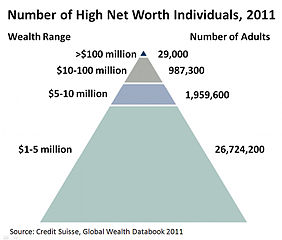You have a small business. You are selling products and services to your area. You render good service. Business is…

See the 3rd tier from top? “Rich” starts there.
We are told that we can. They show us examples of people who ‘pulled themselves by the bootstraps’ by working hard and became rich as a result. We are told to follow their example and do the same. And that anyone with talent and hard work can do it.
Is that really true?
Lets take USA as an example and see if you can make it and get into the ranks of the rich, in your lifetime, by working hard. And lets use very easily accessible statistics and tools to make our calculations so that anyone can replicate it:
First lets define ‘rich’. For what you consider ‘rich’, may not actually be rich at all – you may believe that having a paid-out house in the suburbs, two modest cars and putting a kid through college and retiring in your late 60s may qualify as ‘rich’. Actually it isn’t – today its not even middle class. However, this is another matter.
The 0.1%
Rightly so, for with the ‘pulling yourself by the bootstraps’ and ‘working hard’ narrative, they explain and justify the wealth of this segment of society. The 0.1%, – 1/10 of the 1% as they are commonly called. According to the narrative we are given, it should be possible for you to get into this segment by hard work, pulling yourself by the bootstraps and some talent.
Because, ‘they did it’, so you should be able to do it too, right?
But make no mistake! These are still not the people you see in business magazines, stock market news shows and the like, mind that! That requires going towards the billion mark.
Instead we are aiming for what we call 0.1% – the people who are in mid-higher level management positions, highly technical jobs and the like. As you can see, we are holding the bar a little low. But if you cant even make it to this segment, there is no way you can make it into the higher segment, so its a solid indicator for our purpose. Now then, how much wealth does getting into the 0.1% require?
According to recent statistics and research, top 0.1% in USA are ~160,000 families with average total net worth of $20 million or more.
The research by Emmanuel Saez and Gabriel Zucman illustrates the evolution of wealth inequality over the last century. The chart shows how the top 0.1% of families now own roughly the same share of wealth as the bottom 90%.
The picture actually improved in the aftermath of the 1930s Great Depression, with wealth inequality falling through to the late 1970s. It then started to rise again, with the share of total household wealth owned by the top 0.1% rising to 22% in 2012 from 7% in the late 1970s. The top 0.1% includes 160,000 families with total net assets of more than $20m (£13m) in 2012.
There you go – you need to be worth $20 million in total assets at the point of retirement – after 40 years in the work force.
Start with a Head start
Let’s give you a head start – let’s say that you have a college degree in a field which is in demand so he will have more opportunities. And that your degree will be in demand for a long while – enough for you to comfortably retire with any fear of layoffs.
When we search in Google ‘how much a college graduate makes in a lifetime’;
On average, a doctoral degree-holder will earn $3.3 million over a lifetime, compared to $2.3 million for a college graduate and $1.3 million for those with a high school diploma. — People with less education in high-paying occupations can out-earn their counterparts with advanced degrees.
(source)
Alright! Now you have a doctorate degree, for you are smart and talented after all. You know – a doctorate – the min. 2 year doctorate degree which can be earned only after completing a min. 2 years’ master’s degree, after completing a 4 years’ worth of regular BS/BA degree in full. In short, minimum ~8 years of college/university instead of 4. And lets say that you didn’t even incur any student loans, or you didn’t have to pay for the education from your family’s pockets – so, you even got the education totally free – something that would cost you from $100,000 to $200,000 depending on which college you go to, even only for 4 years’ of study. Leave aside the rest 2 years’ master’s and 2 years’ doctor’s degrees.
Now at this point, you are slated to make ~$3.3 million over a lifetime – leave aside a mere 40 years of work-life. But lets set the bar even lower by saying that you will make it in 40 years while you are working.
You need more than oxygen to live
Of course, since you are not going to be solely breathing air to survive, you will have expenses. The average cost of living in US is;
$20,194 per person per year according to Bureau of Labor Statistics
(source)
Of course, this is a nation-wide average and its quite low compared to more expensive regions of United States. However for the sake of argument, lets accept this number and say that you are living like a hermit with the bare minimum even if you have to live in a rather expensive area.
Basically you are going to spend ~$20,000 yearly on expenses. For 40 years of work-life (the time span we agreed on) this makes roughly ~$800,000 in total expenses. Without any major expenses like a serious healthcare expense, major life event (wedding, funeral etc) or taking care of anyone else – like children, a spouse, or an elderly family member.
With that expense accounted for, you are slated for having earned $2.5 million over 40 years of work-life.
Even for this, we assume no major issues happened in your career; you never made bad decisions, you were never laid off for extended durations of time, you never had to sift your way through in a recession, you never were in the wrong place at the wrong time.
Still not enough!
Not enough. You are $17.5 million short of the average $20 million you should have.
You have to live and work seven lifetimes to make it to that amount with this rate of income.
Then let’s boost you up some more. Let’s say that not only you had a perfectly stable and smooth life, but also you managed your life smarter than the average talented person, and doubled your income.
You still stand at a $5 million in a lifetime. Not enough. Again.
Well… Despite these figures already included them, lets say you made even better decisions than your peers, you worked three times harder and you were paid three times more. And you tripled your lifetime earnings.
You still stand at a $7.5 million. You couldn’t even gather HALF the wealth required.
So, what happened?
- You were someone little short of a genius
- You had a doctorate degree – an expert in your field
- You didn’t have to pay for your education – you got it free
- Your expertise was in-demand all your life
- You worked 3-5 times harder than all of your peers
- Your career is full of successes and achievements
- You lived like a hermit to cut your expenses
- You never had any major problem in your life
- You didn’t marry, you didn’t have kids
- You worked a full nonstop 40 years of your life
- You saved and managed to increase your savings
You STILL couldn’t make it even into the low-level ranks of the rich.
Leave aside making it into the ranks of people who get praised in financial magazines, newspapers, tv shows.
What does this mean?
It means all the ‘pulling yourself by the bootstraps’, ‘self-made’, ‘success’ stories were total bullsh*t. None of the people who are shown as examples for that could make the money they have on their own by hard work. Its not humanely possible.
Well, actually it is – if you make OTHER people work and take the profits.
If you look at the profiles and histories of people who are pitched to us in that way, you would see that they either own companies which basically make other people – like you – work and take the profits while paying them a fraction of the profits as salaries (as little as possible of course), OR, they had invested in companies (which do exactly the same thing) and increased their wealth in that fashion. The more profitable the company is, the faster the ‘self-made’ owner gets rich, and the higher in the ranks of the rich s/he climbs.
The term ‘Profitable’ requires two things: Making as much revenue as possible, while paying as little salary as possible. Including yours.
That’s why you didn’t make it into the ranks of the rich – its not like you didn’t create enough economic value or did not contribute enough to your society. You did. You did it far better than many others and you worked at it harder than many others.
Except, those who owned the company were giving only a fraction of that value you created back to you, and they were taking the majority as profits. In short, the economic value you were generating along with all your other co-workers, was just concentrating in the hands of those who owned the company instead of you getting a decent fraction of your own work. And as long as this wealth-concentration mechanic exists and keeps giving you only a fraction of the value of your work, you will never get rich like the ones who get the majority of the value of your work without actually contributing to it.
Next time when someone like that is being sold to you with the ‘hard work & bootstraps’ nonsense, remember how he actually got rich – NOT by his hard work.
By yours.
Via Populi
Latest posts by Via Populi (see all)
- How media demonizes Vladimir Putin – or any other character – Excellent example - December 11, 2015
- Incredible US Hypocrisy – Favorable results for US means that ‘this time’ Venezuela Elections were ‘legitimate’ - December 9, 2015
- Surprisingly, Venezuela Elections are more legitimate than US elections - December 7, 2015
![]() Working Hard? Thinking You will get Rich by Hard Work? by Via Populi is licensed under a Creative Commons Attribution-ShareAlike 4.0 International License.
Working Hard? Thinking You will get Rich by Hard Work? by Via Populi is licensed under a Creative Commons Attribution-ShareAlike 4.0 International License.









